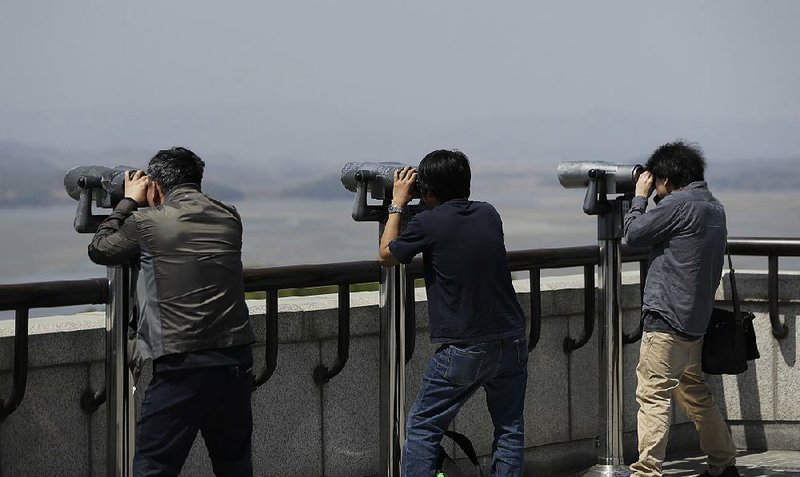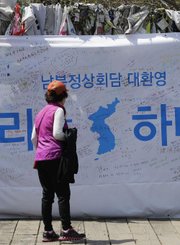WASHINGTON -- President Donald Trump and Defense Secretary James Mattis spoke Saturday with their South Korean counterparts after the meeting between the leaders of the two Koreas, and Trump said "things are going very well" as he prepares for a summit with the North's Kim Jong Un.
Mattis and Defense Minister Song Young-moo said they were committed to "a diplomatic resolution that achieves complete, verifiable and irreversible denuclearization" of North Korea, according to the Pentagon's chief spokesman, Dana White. Mattis also reaffirmed "the ironclad U.S. commitment" to defend South Korea "using the full spectrum of U.S. capabilities."
Trump tweeted Saturday that he had "a long and very good talk" with South Korean President Moon Jae-in. He also said he updated Japanese Prime Minister Shinzo Abe about "the ongoing negotiations" for an anticipated summit with Kim, tentatively scheduled for May or early June.
Today, South Korean presidential spokesman Yoon Young-chan said Kim plans to shut down the country's nuclear test site in May and reveal the process to experts and journalists from the United States and South Korea. He said Kim made the comments during his summit with Moon on Friday.
According to Yoon, Kim also said Trump will learn he's "not a person" to fire missiles toward the United States.
Yoon said North Korea also plans to readjust its current time zone to match the South's. The North in 2015 created its own "Pyongyang Time" by setting the clock 30 minutes behind the South.
"If we maintain frequent meetings and build trust with the United States and receive promises for an end to the war and a nonaggression treaty, then why would [we] need to live in difficulty by keeping our nuclear weapons?" Yoon quoted Kim as saying.
Moon and Kim have pledged to seek a formal end to the Korean War, fought from 1950-53, by year's end and to rid the Korean Peninsula of nuclear weapons. Trump has said he's looking forward to his meeting with Kim and that it "should be quite something."
"Things are going very well, time and location of meeting with North Korea is being set," Trump tweeted. A statement from the White House describing the call between Trump and Moon also referred to the North's future being contingent upon "complete, verifiable, and irreversible denuclearization."
Mattis has said the U.S. is "optimistic right now that there's opportunity here that we have never enjoyed since 1950" and any progress will be up to the diplomats.
The Korean War fighting, which also involved China, cost hundreds of thousands of lives and ended in 1953 with the declaration of an armistice, not a peace treaty. That has left the peninsula in a technical state of war for decades.
China, Japan and Russia -- North Korea's neighbors -- while offering praise for the summit meeting with South Korea that riveted the world last week, appeared to acknowledge one thing: Now comes the hard part.
In the accord struck Friday, the two sides confirmed a "common goal of realizing, through complete denuclearization, a nuclear-free Korean Peninsula," a commitment North Korea has made before but then flouted by conducting six nuclear tests. The two Korean leaders also pledged to work toward a peace treaty.
The North's neighbors all have stakes in holding Pyongyang to any commitment that may come out of future talks.
China, which has been enforcing U.N. economic sanctions against its longtime but wayward ally North Korea, welcomed the agreement and urged the two Koreas and other countries to maintain the momentum for dialogue and work together to denuclearize the Korean Peninsula.
Abe described the commitment as a "positive move toward the comprehensive settlement of various issues surrounding North Korea."
In Russia, the Kremlin hailed the agreement as "very positive." Dmitri Peskov, the spokesman for President Vladimir Putin, said the Russian president "has stressed many times that sustainable conflict resolution on the Korean Peninsula can only be based on direct dialogue of both sides."
But Iran warned the leaders of North and South Korea to keep Trump out of their reconciliation efforts.
"The American government has shown with the Iran nuclear deal that it does not hold to international agreements and is therefore not trustworthy," Iranian Foreign Ministry spokesman Bahram Ghassemi said in Tehran.
Trump has complained bitterly about the 2015 deal, which aims to prevent Iran from developing a nuclear weapon. He has threatened to effectively withdraw from it next month unless its "flaws" are reworked.
NORTH'S NEWS COVERAGE
North Korea's main newspaper devoted four of its six pages Saturday to the previous day's summit between Kim and Moon. It brightened its usually drab pages with 62 color photographs from the historic event.
It even printed the leaders' joint declaration professing a goal of denuclearization on the Korean Peninsula.
But, like other state-run North Korean media, the newspaper, Rodong Sinmun, gave no hint to its readers whether Kim would genuinely consider giving up his nuclear weapons, or what he might demand in return.
Rather, it focused on Kim's new diplomatic turn. "With his boundlessly noble love for the nation and with his sophisticated political skills, he has laid the groundwork for a turning point in North-South Korean relations," the propaganda-filled Rodong said.
However positive the goals described in the three-page agreement, the critical question remained: Does Kim intend to bargain away his nuclear weapons, or are his diplomatic overtures aimed only at softening his image and easing sanctions against his impoverished country?
The accord set no timetable for denuclearization but said the two sides planned to achieve a permanent peace within the year. Talks to formally end the Korean War would require negotiations involving the main combatants: North and South Korea, China and the United States.
The North Korean media listed denuclearization as the last of three major agenda items from the summit meeting at the border village of Panmunjom -- unlike the South Korean government, which cited it first. The North's coverage described extensively how Kim was spearheading efforts to open "an era of national reconciliation and solidarity, and peace and prosperity" on the divided peninsula.
Still, its coverage of the summit meeting reconfirmed North Korea's dramatic shift from raising tensions through weapons tests to creating a reconciliatory mood through high-profile meetings that would have been unthinkable just several months ago.
Skeptics say Kim's goal remains to be accepted as a nuclear power. He is merely trying to improve ties with South Korea to steer it further from the United States and to escape sanctions that are increasingly hurting the North's economy, they say.
But if Kim intends to win diplomatic recognition, a peace treaty and economic aid from Washington and its allies, as South Korean officials hope he does, trading away his nuclear arsenal is his only bargaining chip. He cannot reveal his hand too soon, they say.
South Korean officials say they have heard directly from Kim a willingness to denuclearize.
In Japan, there was caution about the lack of specifics in the accord. The document fell far short of the Trump administration's demands for the dismantlement of the North's arsenal and of the need for inspections to verify that the weapons no longer exist, officials and commentators said.
The Japanese foreign minister, Taro Kono, called for North Korea to take "concrete actions for the dismantlement of all weapons of mass destruction, including biological and chemical weapons, and ballistic missiles of all ranges in a complete and irreversible manner."
Abe, who has strained relations with South Korea, implied that the new accord may not be too different from a similar commitment in 2007 between a previous South Korean president, Roh Moo-hyun, and Kim Jong Il, the father of the current North Korean leader. That accord fell apart soon after it was signed.
"We would like to think about how we respond to the current statement, analyzing and comparing it with the past statement," Abe said.
Of all the North's neighbors, Japan is perhaps the most uneasy about the process that began at the inter-Korean summit meeting. It fears Washington will agree to trade away the North's long-range intercontinental missiles that can hit the United States, but allow Pyongyang to keep its medium-range missiles, leaving Japan vulnerable.
Abe went out of his way to remind reporters that he had spent 11 hours with Trump this month, insisting that his proximity to the American president meant he had not been left out of the negotiations over North Korea.
In China, the state-run news media stressed the need for the United States to quickly enter the picture and seal the deal.
Information for this article was contributed by Matthew Pennington and staff members of The Associated Press; by Choe Sang-hun and Jane Perlez of The New York Times; and by Gretel Johnston of Deutsche Presse-Agentur.
A Section on 04/29/2018


